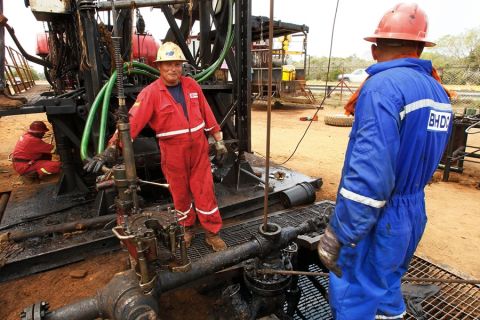China's oil refinery throughput this year is forecast to rise 7.8%, according to a think tank of state energy group CNPC, reversing last year's decline as the world's second-largest oil consumer and is set for a recovery in fuel demand.
Refinery throughput is estimated to reach 733 million tonnes, or 14.66 million barrels per day (MMbbl/d), for 2023, China National Petroleum Corporation's (CNPC) Economics and Technology Research Institute (ETRI) said in its annual industry outlook released on March 27.
With Beijing determined to revive its sagging economy after lifting COVID-19 controls last December, Chinese refined fuel consumption is expected to rebound with top refiner Sinopec earlier on March 27 separately predicting a 3.3% increase in its annual throughput this year.
"(We are) expecting refined fuel consumption to rebound progressively in 2023...with gasoline set for strong recovery, diesel fuel to hold steady and improving further while jet kerosene is bottoming out," ETRI said.
That will likely lead to 6.2% growth in this year's crude oil imports to 540 million tonnes, or 10.8 MMbbl/d, the research unit said.
The growth is in line with forecasts by independent analysts predicting China's oil imports will rise to new highs this year as a result of the COVID policy change and new refineries coming on stream.
The CNPC think tank also predicted that the country's refineries will operate at an average of 79.4% of their capacity in 2023, up from 73.6% last year. China has become the world's largest refiner following a recent petrochemicals-led expansion.
Natural gas consumption is seen rising 5.2% this year to 386.5 billion cubic meters (Bcm), the outlook said. China's state economic planner reported that gas consumption fell by 1.7% last year in its first decline in two decades as pandemic measures and high global prices suppressed economic activities.
The CNPC think tank predicted that China's gasoline output will increase by 7.6% this year to 156.4 million tonnes, diesel output will rise by 6.1% to 202.9 million tonnes and jet fuel production will surge by 18.4% to 34.9 million tonnes.
Recommended Reading
US Decision on Venezuelan License to Dictate Production Flow
2024-04-05 - The outlook for Venezuela’s oil industry appears uncertain, Rystad Energy said April 4 in a research report, as a license issued by the U.S. Office of Assets Control (OFAC) is set to expire on April 18.
Hirs: LNG Plan is a Global Fail
2024-03-13 - Only by expanding U.S. LNG output can we provide the certainty that customers require to build new gas power plants, says Ed Hirs.
Renewed US Sanctions to Complicate Venezuelan Oil Sales, Not Stop Them
2024-04-19 - Venezuela’s oil exports to world markets will not stop, despite reimposed sanctions by Washington, and will likely continue to flow with the help of Iran—as well as China and Russia.
CERAWeek: Energy Secretary Defends LNG Pause Amid Industry Outcry
2024-03-18 - U.S. Energy Secretary Jennifer Granholm said she expects the review of LNG exports to be in the “rearview mirror” by next year.
From Satellites to Regulators, Everyone is Snooping on Oil, Gas
2024-04-10 - From methane taxes to an environmental group’s satellite trained on oil and gas emissions, producers face intense scrutiny, even if the watchers aren’t necessarily interested in solving the problem.





